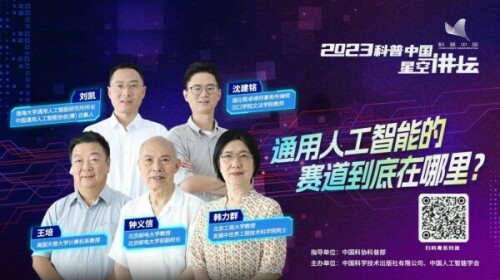
-
"China Science Communication Lecture" program holds special event to inquire track of artificial general intelligence
2023-09-05
Recently, the "China Science Communication Lecture" program held a special event to inquire the track of artificial general intelligence.

The event was livestreamed simultaneously on the platforms including the client side of China Science Communication, People's Daily Online, Guangming Net and Tiktok, attracting a total of 5 million plus viewers to participate.
Under the guidance of the Department of Science Popularization of the China Association for Science and Technology (CAST), the event was co-sponsored by the China Science and Technology Press and the Chinese Association for Artificial Intelligence (CAAI), and organized by Beijing Zhongke Xinghe Cultural Media Co., Ltd.
Under the theme of "Track of artificial general intelligence", the event invited Liu Kai, director of the institute of artificial general intelligence at Bohai University and convener of the Chinese Artificial General Intelligence (preparation) (CAGI) serve as the chair.
Zhong Yixin, professor at Beijing University of Posts and Telecommunications, Wang Pei, professor at the department of computer science at Temple University in the United States, Han Liqun, professor at Beijing Technology and Business University and member of the Academy of Engineering and Technology of the Developing World (AETDEW), and Shen Jianming, lecturer of the school of humanity and law at Hankou University were invited to share views on different topics from different perspectives to help the public better understand and respond to the unprecedented era of "intelligent revolution”.
"Statistics is an approach to understand things, and cognition based on understanding is the highest level of cognition", said Professor Zhong Yixin in his speech entitled "Paradigm Revolution: The Successful Path of AI Innovation Research". Zhong analyzed the current fundamental problems in the computer field, noting that further exploration requires a major transformation of research paradigms.
"All decisions are based on weighing the pros and cons, and there is no such thing as a hundred harms without any benefits. In terms of artificial intelligence, the advantages far outweigh the disadvantages. And we must do our best to avoid those disadvantages and solve the related problems", said Professor Wang Pei in his speech entitled "The Goals, Possibilities, Approaches, and Consequences of Artificial Intelligence". Wang responded to the current misconceptions and the hot topics of public concerns in the regard of the field.
"What we are most lacking now is the talent who dares to venture into unexplored fields to open up new tracks and lead new competitions with new directions and theories, especially in the field of artificial general intelligence", said academician Han Liqun in his speech entitled "Is Brain-like Intelligence an Effective Way to Implement Artificial General Intelligence?" Han delved into the effectiveness of brain imitation technology from the perspectives of brain science and neuroscience.
"The fundamental requirement for artificial intelligence to achieve legal reasoning is to reproduce the basic features of human thinking and demonstrate the thinking process of human judges", said Mr. Shen Jianming in his speech entitled "Limits and Prospects of Artificial Intelligence in Legal Reasoning Systems". Shen elaborated on whether artificial intelligence could have some room in the legal profession system.
At the roundtable session, the above 5 experts conducted comparative analysis and exchanged views on different theories and technical routes of the artificial general intelligence.
They had full discussions on the impact of the widespread application of artificial intelligence on legislation, social governance, and people’s daily life.
The “China Science Communication Lecture” program is a platform built for sci-tech professionals from different fields to showcase themselves, and get the general public more engaged in sci-tech activities.
The platform is expected to help sci-tech professionals to demonstrate the ethos of the scientific community and achieve sound social effects.
Since it was launched in 2022, a total of 14 lectures have been delivered, mobilizing 14 national societies and 6 local branches of CAST to participate and co-organize.
70 experts, including academician Ouyang Ziyuan, academician Chen Junshi, academician Sun Baoguo, and academician Fan Daiming, have been invited to deliver lectures, with a cumulative dissemination volume of over 92.2 million person-times.
Tag: Department of Science Popularization of CAST, Opinion